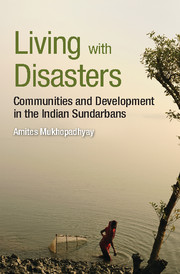Book contents
- Frontmatter
- Dedication
- Contents
- Maps and Illustrations
- Tables and Charts
- Glossary
- Acronyms
- Acknowledgements
- Note on Transliteration
- Maps
- Illustrations
- Charts
- 1 Introduction
- 2 From Wasteland to Wonderland: The Making of a Heritage Site
- 3 Governing the Sundarbans Embankments Today: Between Policies and Practices
- 4 Treading a Fine Path between River and Land: Livelihoods around Embankment
- 5 Beldars, Embankment and Governance: Question of Aboriginality Revisited
- 6 Catching Prawn, Endangering Embankments: Sustainability-Unsustainability Rhetoric
- 7 Conclusion
- Bibliography
- Index
3 - Governing the Sundarbans Embankments Today: Between Policies and Practices
Published online by Cambridge University Press: 05 March 2016
- Frontmatter
- Dedication
- Contents
- Maps and Illustrations
- Tables and Charts
- Glossary
- Acronyms
- Acknowledgements
- Note on Transliteration
- Maps
- Illustrations
- Charts
- 1 Introduction
- 2 From Wasteland to Wonderland: The Making of a Heritage Site
- 3 Governing the Sundarbans Embankments Today: Between Policies and Practices
- 4 Treading a Fine Path between River and Land: Livelihoods around Embankment
- 5 Beldars, Embankment and Governance: Question of Aboriginality Revisited
- 6 Catching Prawn, Endangering Embankments: Sustainability-Unsustainability Rhetoric
- 7 Conclusion
- Bibliography
- Index
Summary
Grand development and islanders’ worries
In 1996, the Directorate of Forests of the Government of West Bengal organized in Kolkata a seminar in memory of William Roxburgh who was not only the father of modern botany in India but also the first botanist to have made plant collections from the Sundarbans. In 1999, the proceedings of the seminar were published in the form of a volume called Sundarbans Mangal. Kiranmoy Nanda, the Minister-in-charge of Fisheries, Government of West Bengal, spelt out the purpose of this specialists’ meeting in the following manner:
A million dollar question [that] peeps in our minds [is] how Sundarbans is gradually losing her treasures. The Sundarbans, largest delta of the World, is the much talked about natural resource site and it is a privilege for the Indians to have such wonderful place of natural grooming and wildlife habitat. With the increasing population pressure the ecosystem of the Sundarbans is losing its balance slowly. The number of wildlives … have gone down considerably owing to deforestation and the destruction of natural habitats. The occasional visit of “Royal Tigers” to the adjoining villages in search of food is a proof of the above statement (Nanda 1999a, 10).
The seminar provided an opportunity for botanists, zoologists, geologists and ecologists to update their knowledge. The issues debated ranged from ecological balance to sustainable mushroom spawn cultivation. Specialists even dwelt at length on the technicalities of embankment construction and its protection against the tidal waves. This was clearly an attempt by the specialists to make the Sundarbans part of the global discourses of conservation and sustainable development. In 2001, the Sundarbans Biosphere Reserve became part of UNESCO's world network of biosphere reserves and as a result, the state forest department now expects an initial grant of 3 million dollars from the UN Development Programme (UNDP) for the protection of the Sundarbans (The Statesman 2002). Today, the World Heritage Site also attracts funding of Rs. 3 crores from the Asian Development Bank (ADB) to conduct research on the development of infrastructure, soil conservation and a livelihood programme for the people in the area. The Sundarban Affairs Department (SAD) will collaborate with the ADB on this. Thus, deals are struck and development agendas are prepared in the government departments.
- Type
- Chapter
- Information
- Living with DisastersCommunities and Development in the Indian Sundarbans, pp. 46 - 72Publisher: Cambridge University PressPrint publication year: 2016



